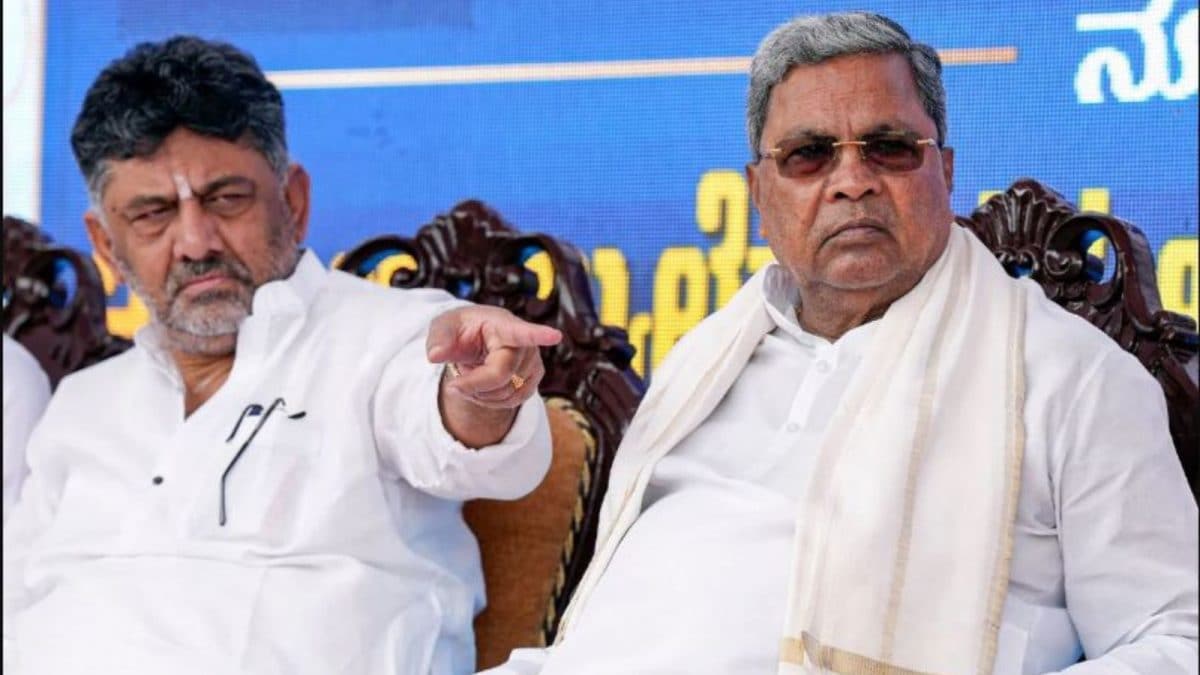Last Updated:
With the contentious Kantharaj report now in cold storage, the government hopes to complete the new caste survey within 60 to 90 days, as demanded by the Congress high command
CM Siddaramaiah said that the Congress high command had summoned him and his deputy, DK Shivakumar, to Delhi, where they were advised that the existing Kantharaj report, being ten years old, no longer reflected the current social realities. (File image: PTI)
With dominant communities pushing back and AHINDA groups demanding delivery, the Congress government in Karnataka is betting on a fresh survey to help Siddaramaiah regain control over the caste arithmetic and consolidate support across competing blocs ahead of key political battles.
With the contentious Kantharaj report now in cold storage, the government hopes to complete the new caste survey within 60 to 90 days, as demanded by the Congress high command.
Sources told News18 that the Congress high command cited the example of Telangana, which completed its caste survey in just 70 days. “So the Karnataka government can also complete it quickly. Much of the base data already exists with the Karnataka State Backward Classes Commission, and only an update with a decade’s gap and inclusion of those left out needs to be added, which should make the process faster,” a senior official said.
Chief minister Siddaramaiah clarified that this will be a fresh, legally mandated enumeration, as the law requires a new survey every ten years. The earlier caste survey was carried out in 2015 through a house-to-house exercise covering 54 parameters. It began on April 11 and concluded on May 30 that year. At the time, Karnataka’s population was 6.11 crore as per the 2011 Census and was projected to touch 6.35 crore by 2015. The survey managed to cover 5.98 crore people, with 1.6 lakh personnel involved, of whom 1.33 lakh were teachers, Siddaramaiah said.
At recent cabinet meetings, Siddaramaiah told his ministers to submit their views on the caste survey in writing, encouraging open but non-confrontational discussion. Those opposing the report flagged issues related to population figures, criteria for backwardness, and the methodology used in assessing economic and educational indicators. Siddaramaiah assured them that any discrepancies would be addressed collectively. “This report is meant to help all communities—even those now opposing it,” he said.
But now, that very report stands effectively shelved.
CM Siddaramaiah said that the Congress high command had summoned him and his deputy, DK Shivakumar, to Delhi, where they were advised that the existing Kantharaj report, being ten years old, no longer reflected the current social realities. The views of the commission’s current chairman, Madhusudhan Nayak, will also be factored into the process.
“Over ten years, a lot has changed. The law allows for a fresh exercise after this period. The high command was clear: the report must reflect today’s reality,” the CM said.
In the Delhi meeting—attended by Congress president Mallikarjun Kharge and MP Rahul Gandhi—the leadership instructed that a new enumeration be conducted within 60–90 days. AICC general secretary KC Venugopal told the media that the survey would be expedited and that inclusivity of all communities was a priority for the party.
Opposition to the Kantharaj report has not only come from the BJP but also from within the Congress. Some party leaders have strongly objected to the findings of the decade-old caste survey.
Siddaramaiah said the decision for a fresh survey was directed by the Congress high command, and a special cabinet meeting convened to take a final call on the contentious backward classes commission report approved it.
Earlier, multiple cabinet meetings on the caste survey discussion were held, many of which saw sharp divisions within the Congress itself. Ministers from the Vokkaliga and Lingayat communities insisted that the previous report was flawed and demanded it be discarded in favour of a fresh one. These dominant groups had already opposed the Kantharaj report publicly, calling it biased, and some cited improper methodology.
Congress ministers from AHINDA communities—representing minorities, backward classes, and Dalits—pushed for the immediate implementation of the original report prepared by Kantharaj and later revised by Jayaprakash Hegde, who at first headed the backward class commission during the BJP rule and submitted the final report to the Congress government in 2024.
Siddaramaiah did not hold back in blaming former CM and now union minister HD Kumaraswamy for blocking the original caste survey report when it was ready to be submitted after his first tenure as chief minister, when he commissioned the study.
The report could not be tabled before his tenure ended in 2018. When the Congress-JD(S) coalition came to power and Kumaraswamy became CM, the report was ready. The then backward classes minister, Puttaranga Shetty, was approached by chairman H Kantharaj and other commission members to formally receive it.
“But Kumaraswamy pressured Puttaranga Shetty not to accept it. He stalled it. That’s the truth,” Siddaramaiah said, holding the JD(S) leader responsible for derailing the process.
Once Kantharaj’s term ended, the BJP government appointed Jayaprakash Hegde as the new chairman. Siddaramaiah pointed out that all commission members were BJP appointees. Hegde submitted his revised version of the report with fresh recommendations on February 29, 2024. “Kantharaj was also present at the time of submission,” he added.
The CM said the report couldn’t be discussed due to the Lok Sabha elections. After his government returned to power, it was placed before the cabinet in 2025.

Rohini Swamy, Associate Editor at News18, has been a journalist for nearly two decades in the television and digital space. She covers south India for News18’s digital platform. She has previously worked with t…Read More
Rohini Swamy, Associate Editor at News18, has been a journalist for nearly two decades in the television and digital space. She covers south India for News18’s digital platform. She has previously worked with t… Read More
- First Published:






